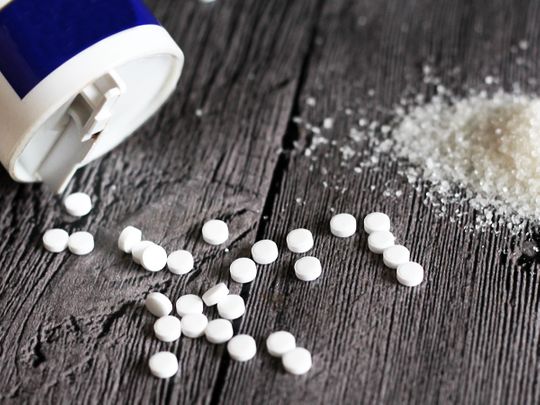
The popular artificial sweetener erythritol, which is used as a sugar substitute in many low-calorie, low-carb and keto products, has been linked to heightened risk of heart attack, stroke and death, according to a study published in Nature Medicine.
Looking at more than 4,000 people in the United States and Europe who were undergoing elective cardiac evaluation, researchers at the Cleveland Clinic found that those who had greater erythritol levels in their blood had a higher chance of experiencing adverse cardiac events. In preclinical studies, they also found evidence that ingestion of erythritol increased blood clot formation.
Researchers caution that more study is necessary and that participants independently had a high prevalence of cardiovascular disease, so the "translatability" of the findings to the general population needs to be determined.
Cardiovascular disease builds over time, and heart disease is the leading cause of death globally. We need to make sure the foods we eat aren't hidden contributors.
Still, the results offer a significant challenge to product marketing that pitches erythritol as a healthy, natural sugar alternative. And the insights arrive as erythritol has come into vogue, with plant-based, keto and low-carb diet trends spurring interest in alternative sweeteners sold as "natural."
According to 2022 reports from research firm NielsenIQ, sales growth for products with erythritol grew 43 per cent over two years, and products that claim to contain "natural sweeteners" grew by 91 per cent. "Sugar-free" products with erythritol are often recommended to individuals with obesity, diabetes or metabolic syndrome - who are already at risk for such cardiovascular health problems, the paper's authors note.
In a statement about the study, Stanley Hazen, a cardiologist at the Cleveland Clinic, called for more research into alternative sweeteners. "Cardiovascular disease builds over time, and heart disease is the leading cause of death globally," he said. "We need to make sure the foods we eat aren't hidden contributors."
Hazen wrote in an email that his team did not set out to study artificial sweeteners, but was rather looking to find chemicals in the blood that identified "who was at risk for a future heart attack, stroke or dying in the next three years." The compound that predicted this "ended up being Erythritol." His team then developed a test for it, independently tested their hypothesis and replicated the findings.
A sugar alcohol that is found in small amounts in fruits and vegetables, erythritol is poorly metabolised, excreted almost entirely in urine and characterised as a "zero-calorie" sweetener. Many foods that claim to be naturally flavoured, such as keto cookies and granola, contain erythritol. But when it is artificially added to processed foods, it is seen at levels "1,000 fold higher than endogenous levels," the researchers wrote.
Greg Neely, a professor of functional genomics at the University of Sydney who has studied artificial sweeteners, said many "natural" labels amount to "misleading marketing," noting that people assume, "If it occurs in nature, it's probably not as bad for us."
Neely said the Cleveland Clinic study is "extremely important, and it will likely trigger immediate changes in what we consume," emphasising that researchers went in "without any specific agenda." The study highlights that "we don't fully understand what the health consequences of industrialised food have been, and just because something is sold as 'natural' doesn't mean it is safe or good for us to consume at an industrial scale."
The merits and shortcomings of alternative sweeteners, such aspartame, sucralose, stevia and saccharin have been debated for years. Often pitched as a weight-loss shortcut that offers the sweet taste of high-sugar foods without the health consequences, such sweeteners have been linked to higher calorie consumption and higher blood sugar levels. One 2019 study suggested that drinking artificially sweetened soft drinks was associated with increased deaths from circulatory disease.
Still, some maintain that such associations are a product of the lifestyle of people who consume these sweeteners, not the sweeteners themselves. And despite decades of studies into the safety of sugar substitutes and whether consuming them helps or harms the body, much of the research is inconclusive.
Still, Neely said he tries to avoid artificial sweeteners "when at all possible."
The incidence of conditions such as obesity and diabetes is rising at a rate "much faster than they would if this was just genetic," Neely said. "So we know our environment is driving these diseases somehow, and the industrialization of our food is one critical component we need to consider."










